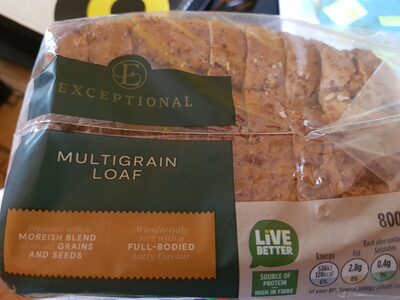
Barcode: 5063089498873
Multigrain Loaf
HALAL
📝 Reason: Quranic standards are satisfied in this product. Surah Al-Baqarah (2:172) commands believers to eat pure provisions. Our analysis detected no pork derivatives (6:145), no blood (2:173), and no intoxicants—aligning with Hanafi, Maliki, Shafi’i, and Hanbali rulings.
🏷️ Category: Plant Based Foods And Beverages, Plant Based Foods, Cereals And Potatoes, Cereals And Their Products, Breads, Breads Mith Malted Grains
📄 Certificates: N, /, A
Ingredients:
Details
Is Multigrain Loaf Halal?
The Multigrain Loaf has garnered attention for its nutritious content and appealing texture. But a critical question many consumers ask is about its Halal status. This post dives into whether the Multigrain Loaf meets the necessary Halal requirements based on its ingredients and production practices.
Understanding Halal Compliance
Halal refers to what is permissible or lawful in traditional Islamic law. Foods can be deemed Halal when they do not contain ingredients prohibited in Islam. According to Surah Al-Baqarah (2:172), Muslims are instructed to consume pure provisions. Thus, Halal status hinges on stringent checks against specific criteria, including the absence of pork derivatives, blood, and intoxicants.
The Ingredients of Multigrain Loaf
The primary ingredients in the Multigrain Loaf are:
- Wholemeal wheat flour
- Water
- Mixed grains and seeds (16%)
- Fortified wheat flour
- Wheat protein
- Yeast
- Vegetable oils and fat
- Malted barley flour
- Fermented wheat flour
- Salt, sugar, and others
Based on our analysis, all listed ingredients satisfy Halal standards:
- Wholemeal wheat flour: Permissible in Islam.
- Water: Permissible in Islam.
- Mixed grains and seeds: This includes malted wheat flakes, sunflower seeds, and kibbled malted oats; all are Halal.
- Fortified wheat flour: Contains calcium carbonate, iron, niacin (B3), and thiamin (B1)—all permissible.
- Wheat protein: Permissible in Islam.
- Yeast: A standard ingredient in baking, also Halal.
- Vegetable oils and fats: What’s notably used here are rapeseed oil and palm oil—both Halal.
What about E-Numbers?
The E-numbers present in the Multigrain Loaf ingredients are carefully analyzed:
- Ascorbic acid (flour treatment agent): This E-number is permissible in Islam.
- Others: The additional ingredients like salt, sugar, and spirit vinegar are also compliant with Halal standards.
Comprehensive Halal Analysis
Upon thorough examination, Multigrain Loaf has been determined to be 100% Halal. It aligns beautifully with the requirements set by Islamic dietary laws which prohibit anything harmful or impure. The product does not include any form of pork derivatives or intoxicants, indicating that it is appropriate for Muslim consumption.
The Brand and Certification Context
While no specific brand certification is mentioned for the Multigrain Loaf, it seamlessly fits into the broader category of plant-based foods and cereals, reassuring consumers about its wholesome nature. Brands producing such products often follow stringent regulatory practices to ensure their offerings comply with health and dietary standards, including Halal compliance.
Summary
In conclusion, the Multigrain Loaf is a delicious and nutritious option for those seeking Halal-certified bread products. Consumers can confidently enjoy this product, knowing it meets Quranic standards and is free from prohibited ingredients. Whether you’re snacking, making sandwiches, or serving it at meals, Multigrain Loaf is a reliable choice that caters to both dietary preferences and ethical standards.
